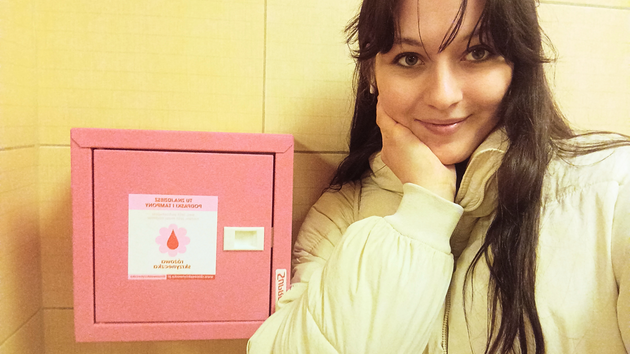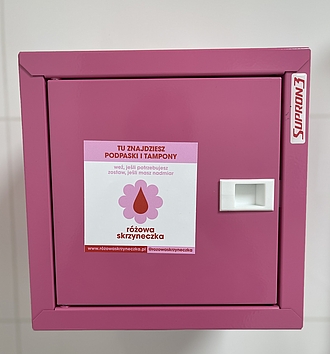Pink boxes as a project carried out during the social work classes
The origins of the project, which resulted in the purchase of the first four boxes, go back to November 2022 and the social project classes. As part of the classes by Dr Andrzej Kacprzak on the development of a social project, social work students had to prepare a task to integrate and solve social problems. Klaudia Królikowska and Julia Ryszkowska came up with the idea of pink boxes.
The theme of menstrual poverty seemed ideal for the project. We menstruate every month as do many other female students and those with a uterus. In addition, the vast majority of us have, at least once, found ourselves in an emergency situation where we unexpectedly got our period and did not have any sanitary products on us. Menstrual poverty was simply something most familiar to us and the most noticeable problem, which could easily be solved...at least to some extent. It was something fresh and original
– says one of the initiators of the project, social work student, Klaudia Królikowska.
At the time, the students did not yet know that they would actually have to implement the project. In February 2023, it turned out that the menstrual poverty project had the greatest potential among the other projects presented in the class and the project group would get the opportunity to implement it.
We tried to undertake as many activities as possible to promote our project, such as posting materials advertising our work on social networks and keeping in touch with the press and media – in May 2023, the youth magazine 'Cogito' published an article about what the project was about. We also undertook various types of cooperation with, among other things, the "Pink Box" foundation – which made our faculty present on the "pink map" and officially join this fantastic campaign
– says Julia Ryszkowska, a social work student and a co-founder of the project.
Pink boxes in the Participatory Budget of the University of Lodz Faculty of Economics and Sociology
The idea of placing pink boxes on the premises of the Faculty of Economics and Sociology was also proposed by students and staff in the Participatory Budget of the Faculty of Economics and Sociology. The staff project was one of the winning projects, so a part of the Participatory Budget funds was used to purchase a further 20 boxes and supplies for them. This is what Dr Justyna Wieloch, the initiator, says about the project:
The idea of submitting the 'pink boxes' project came naturally as a consequence of the changing climate around women and women's themes. I am happy to note that we are increasingly speaking out on issues that are important to us, strongly protesting against the marginalisation of our problems and needs, but also normalising topics hitherto considered shameful, although so very human. Menstruation and the problem of menstrual exclusion is a good starting point for sensitising the community, including academia, to women's down-to-earth problems that can affect their sense of comfort and security on a daily basis. I am delighted that my proposal has found support among the staff and employees of the faculty, who I sincerely thank for every vote they have cast. I also hope that once the project sets off, the scepticism of those unconvinced will melt away.
Pink boxes
Placing pink boxes in public spaces is socially important for several reasons. Firstly, the problem of menstrual poverty affects many women and girls around the world and is often overlooked or simply ignored. Access to hygiene products is essential for health and well-being during menstruation. Providing access to personal hygiene products can significantly improve the quality of life of women and girls and reduce the risk of infection or disease. The pink boxes are also about tackling social inequalities. Many people around the world, including in Poland, often simply cannot afford to buy personal hygiene products.
Research shows that so-called menstrual poverty may affect one in five women in Poland. Poverty-stricken women and girls cannot afford, among other things, the monthly purchase of menstrual hygiene products. When faced with the choice of whether to buy food for the family or personal hygiene products, they often have to give up buying the latter, which seems to be a civilisation standard in the 21st century
– Dr Izabela Desperak, Faculty of Economics and Sociology, University of Lodz.
According to the authors of both projects, education on menstrual poverty should be carried out at various levels, including schools, NGOs, government and local communities. This will help to raise public awareness, effectively reduce the stigma of menstruation and ensure equality in access to hygiene products for women and girls around the world.
It is very important to raise public awareness of menstrual poverty and its impact on health and quality of life. Society still needs education on the topic of menstrual poverty, as it is still a taboo subject that is not widely discussed
– says Julia Ryszkowska.
Pink boxes at the Faculty of Economics and Sociology
As a result of the two implemented initiatives, the Faculty of Economics and Sociology currently has 24 pink boxes, supplemented with personal hygiene products by the Faculty Facilities Management and Technical Centre The pink boxes at the Faculty of Economics and Sociology can be used by anyone who needs them. Following the principle "take what you need, leave if you have excess!", we can also all contribute to the project by supplementing the pink boxes.
Both projects have been carried out thanks to the funds from the Dean of the Faculty.
Source: Julia Ryszkowska, Klaudia Królikowska
Edit: Faculty Development Centre


